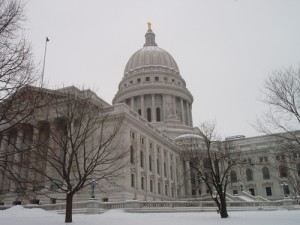Tax Cuts
Governor Scott Walker announced a tax cut proposal at his State of the State address last month. He plans to utilize part of a $912 million budget surplus to lower state income and property taxes. The plan includes:
- A property tax cut of about $131 on a $150,000 home, Wisconsin’s median home value
- An income tax cut of $44 to $58 for each tax filer
- A change in tax policy that would result in the state no longer withholding more income taxes than actually owed, resulting in about $58 more per month per family
The governor’s plan adds $100 million to the state’s rainy day fund, but raises the structural deficit by about $100 million to $725 million at the end of the biennium. Assembly Republicans have indicated strong support for the plan, while Democrats and Senate Republicans have expressed concern.
The legislature is in special session to consider the proposal.
Shared Governance
PROFS continues to lobby to preserve shared governance as described in Chapter 36 of state statutes and UW System Regent policies. Key legislators said they would like to see changes in university governance at a Regent meeting last fall.
Fall Elections
State Senator Dale Schultz (R-Richland Center) announced he will not seek re-election in November. Schultz has been at odds with his Republican Senate colleagues and faced a Republican primary opponent in August.
State Senator Kathleen Vinehout announced last month she will not challenge former Trek executive and Commerce Secretary Mary Burke for the Democratic gubernatorial nomination.
Wisconsin Retirement System
The State of Wisconsin Investment Board (SWIB) announced last month the two funds it manages for the Wisconsin Retirement System (WRS) posted strong gains in 2013, allowing for the first pay increase in five years for annuitants.
PROFS is currently monitoring two bills affecting WRS:
- Assembly Bill 470 would increase the minimum retirement age by two years. If passed, it would apply to workers 40 and younger.
- Assembly Bill 471 would calculate benefits based on the five highest earnings periods, a change from the current three-year formula.
Both bills are in committee awaiting a public hearing.
UW System
The University of Wisconsin Board of Regents appointed UW Colleges and UW Extension Chancellor Raymond Cross next president of the University of Wisconsin System. Cross succeeds Kevin Reilly who stepped down in December to take a position with the American Council on Education. UW-Extension Interim Provost and Vice Chancellor Aaron Brower was named Interim Chancellor of UW Colleges and Extension.
Several campuses are in the process of searching for new chancellors – UW-Green Bay, UW-Stout, UW-Oshkosh, and UW-Colleges and Extension.


